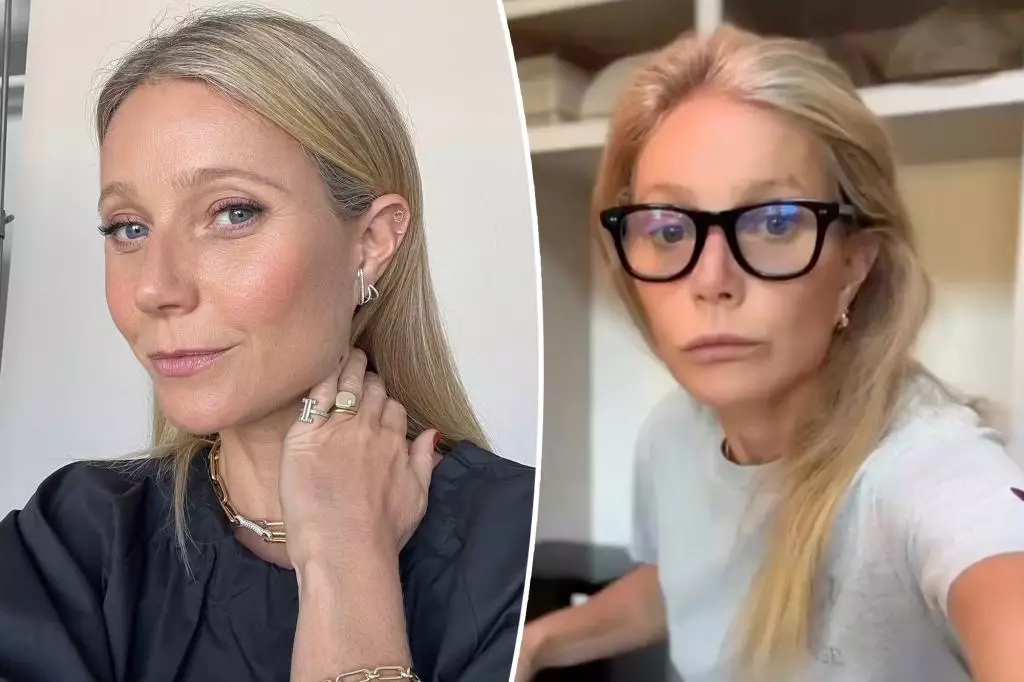Gwyneth Paltrow’s recent appearance has ignited a storm of conversations that extend beyond her personal choices, touching on societal expectations and the pressures faced by women, especially those in the limelight. The noticeable change in her lips, which many suspect to be the result of cosmetic enhancements, serves as a mirror to the ongoing obsession with youthfulness and perfection. If we peel back the layers, what’s truly at play is a cultural fixation that equates aesthetic perfection with success, credibility, and desirability. Gwyneth, already an icon for wellness and luxury, finds herself at the intersection of authenticity and societal image management. Her willingness to be scrutinized—whether for her makeup, her appearance, or her personal choices—demonstrates the complex relationship between celebrity and authenticity in today’s digital age.
While some praise stars for embracing their natural look, the overwhelming majority tend to scrutinize even minor alterations, often linking them to a narrative of insecurity or superficiality. Paltrow’s facial changes, whether real or perceived, highlight a larger dilemma: how much should celebrities, who are also brand ambassadors for a beauty and health ethos, be transparent about their cosmetic interventions? The question isn’t only about her appearance but about how society perceives and judges women’s decisions to modify their bodies. Are these changes empowering acts of self-care or symbols of societal pressure? The debate exposes a core truth: beauty standards are deeply ingrained, and they heavily influence individual choices, often at the expense of authenticity.
The Double-Edged Sword of Celebrity Transparency
Gwyneth has historically been open about her use of cosmetic procedures, acknowledging that she employs injectable treatments like Xeomin to maintain her youthful glow. Her candor was once revolutionary, challenging the stigma associated with cosmetic enhancements and encouraging a more accepting attitude towards aging gracefully—or, as some prefer, aging on their own terms. However, today’s conversations suggest that honesty isn’t enough; it’s how she integrates her authenticity into her public narrative that truly matters.
The crux of this issue lies in the perception of integrity. As someone whose brand—Goop—is built around wellness and transparency, any perceived discrepancy between her claims and her appearance can lead to accusations of hypocrisy. Critics argue that her promotion of anti-aging products should be complemented with openness about her own interventions. Despite her previous admissions, the current scrutiny reveals a lingering societal discomfort with visible signs of cosmetic work, even when justified as self-care. This tension underscores a broader cultural inconsistency: we valorize honesty but often punish or dismiss it when it conflicts with societal ideals of natural beauty.
Gwyneth’s experience also raises questions about the pressure women face to conform to unrealistic standards while simultaneously feeling the need to defend their choices as genuine. This creates a paradox where transparency becomes a risky move, potentially undermining their credibility or inviting unnecessary judgment. Ultimately, her story exemplifies the ongoing struggle between societal expectations and personal agency—a battle that many women, not just celebrities, grapple with in their pursuit of confidence and self-expression.
Redefining Beauty Through Personal Empowerment
What does Gwyneth Paltrow’s evolving appearance tell us about modern notions of beauty? For some, it’s a symbol of self-empowerment—a deliberate choice to look and feel their best. For others, it serves as a reminder of how societal standards are often internalized and reflected in our desire to appear youthful and polished. Yet, perhaps the most compelling narrative emerging from her story is the recognition that beauty is inherently subjective. The societal verdict, whether positive or negative, is ultimately shaped by individual perceptions.
As more women and men refuse to succumb to societal pressures, a shift towards embracing imperfection and diversity may be inevitable. Gwyneth, by being candid about her experiences with cosmetic procedures, can serve as a catalyst for a broader conversation on authenticity. She exemplifies the possibility of integrating self-care with honesty, rather than succumbing to the toxic cycle of superficial perfectionism.
Gwyneth Paltrow’s recent appearance is more than just a fleeting celebrity gossip story; it’s a reflection of a society that is gradually wrestling with its own standards of beauty and authenticity. While she undoubtedly faces pressure to maintain a certain image, her openness and vulnerability—whether intentional or not—may inspire others to redefine what it means to age gracefully and authentically. Ultimately, her journey encapsulates the complex, often contradictory, ways in which we perceive beauty, self-worth, and societal validation in the modern world.

